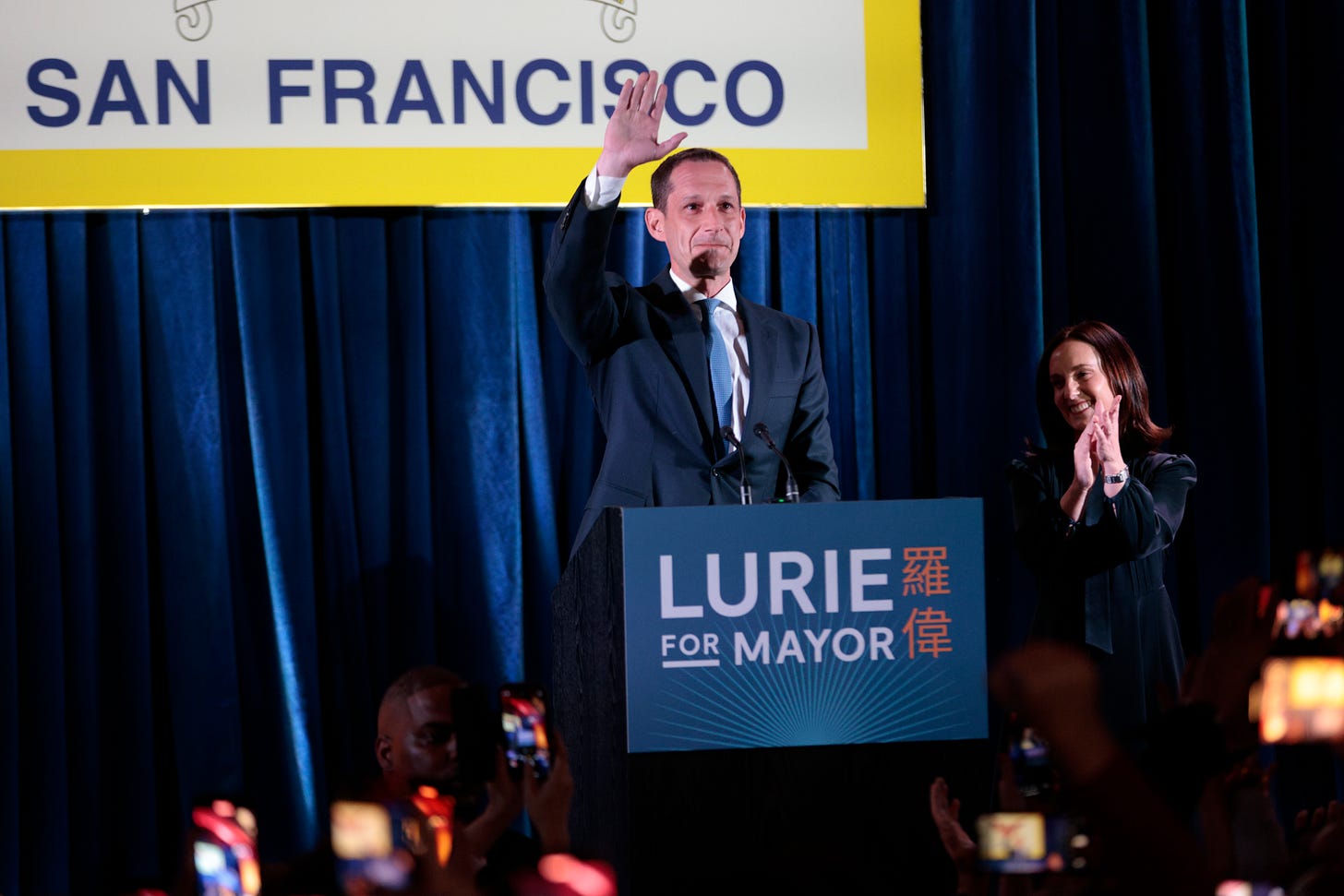Maybe Not Their First Choice But Tech Gets a New, Moderate SF Mayor
Plus, blockchain AI funding soars & Bowery Farms shuts down
San Francisco venture capitalists didn’t get all the results they’d hoped for in this week’s local elections. Two of the biggest tech movers in local politics — former Sequoia chairman Michael Moritz and SV Angel founder Ron Conway — saw their mayoral candidates fall.
Still, VCs on both sides of the aisle who’ve been upset for years about the city’s left-wing policies had plenty to celebrate.
Daniel Lurie, an heir to the Levi’s fortune with no political experience, spent $13 million, mostly his own money, and bested incumbent London Breed in the Mayor’s race. More importantly for the city’s “moderate” Democrats, who split their votes three ways, he also defeated Aaron Peskin, the veteran North Beach supervisor and progressive stalwart whom Moritz recently singled out as a radical who had ruined the city.
Lurie wasn’t the top choice of tech power-brokers. But he’s no stranger to the city’s business elite, and certainly says the right things about wanting to work closely with tech industry industry leaders and make the city welcoming for their companies.
Voters also broke the progressive’s hold on the Board of Supervisors for the first time in 25 years. Another bete noire of investors, Democratic Socialist Supervisor Dean Preston, appeared as of this writing to be on the verge of losing his seat.
For a handful of high-profile, pro-Trump San Francisco VCs, led by David Sacks and his partners on the All-In podcast, Tuesday’s election was a clear win locally as well as nationally. They’d helped stir the SF backlash against progressive politics that started back in 2022 with the recalls of District Attorney Chesa Boudin and three school board members. Elon Musk had even weighed in on local matters, pledging money to defeat Preston (his opponent, Bilal Mahmood, refused the offer.)
Most San Francisco tech leaders are not Trump supporters. But they tend to be on the conservative end of the city’s all-blue political spectrum, and some are vehement critics of progressive politics. Y Combinator chief Garry Tan has been vocal on social media about the failings of the city’s political class, and especially the breakdown in public safety. He celebrated the SF moderates’ performance on X Wednesday.
For Moritz, also a staunch anti-Trumper, it wasn’t so rosy. He and his political group, TogetherSF, poured some $15 million into the Mayoral campaign of Mark Farrell and a ballot measure called Proposition D, but it was for naught.
Farrell, the most conservative candidate in the all-Democratic field, was once a VC himself, and a former supervisor. In addition to Moritz and TogetherSF, he enjoyed the backing of other big-money moderates and also Republicans—notably hedge-fund manager William Oberndorf — who’d long been aligned around a group called Neighbors for a Better San Francisco.
But Farrell had made some powerful enemies over the years, especially in 2018 when he schemed with Peskin to oust Breed from the interim Mayor post following the death of Ed Lee. He also played fast-and-loose with ethics rules governing campaign finance, drawing a fine of more than $100,000 on the eve of the election. That gave his opponents, including former Mayor Willie Brown, the ammunition they needed, and he fell rapidly in the polls after enjoying a lead early on.
Proposition D, which became intertwined with Farrell’s campaign, would have cut in half the number of city oversight commissions–there are now about a 130. The argument was that many commissions were useless and whatever oversight there was mostly got in the way, but the Prop D effort was criticized as ham-handed, and without broader support it appears to have been doomed by Farrell’s slide.
Conway, who has built strong relationships with Democratic power players like Nancy Pelosi, stuck with Breed. (So did Michael Bloomberg, who Breed endorsed in his brief run for President and who dropped $1 million on her campaign.) Breed was also on the moderate side, and had been especially strong on pro-housing policies, winning her the backing of YIMBY groups. But a late-breaking corruption scandal underscored her ties to a political machine that already had more than its share of corruption scandals, and voters felt she’d had plenty of time to get her arms around the city’s problems.
Not much separated the three moderate candidates on policy, and even Peskin’s views weren’t that far off, at least on paper. All stressed public safety, more housing, and the need for business-friendly measures to revive downtown, albeit with differences in the details.
Lurie had previously helmed a housing non-profit and had the resources to rise from obscurity, presenting himself as a genial but sharp technocrat who could bring fresh eyes to the city’s problems and wasn’t beholden to entrenched interests. In a historic “change” election, that proved a good sell.
It will be to Lurie, now, to cut through the thickets of SF government. With a serious budget squeeze and numerous festering problems greeting him when he arrives at City Hall, it won’t be easy.
— from Jonathan Weber, the author of an upcoming book on San Francisco’s relationship with the technology industry, the former editor-in-chief of the Moritz-owned San Francisco Standard, and a contributing editor here at Newcomer.
One Big Chart
Funding to Blockchain AI Startups Soars
Former President Donald Trump’s victory Tuesday has many investors excited about a potential blockchain resurgence, especially when it intersects with the AI funding boom.
Global venture funding for startups that use blockchain technology to power AI tripled in 2024 compared with the three prior years, new PitchBook data shows. Investors have put up $436 million for the sector so far this year.
Many of these companies pitch the decentralized nature of blockchain as a boon for data privacy. The blockchain architecture doesn’t work very well for powering massive models the size of OpenAI’s or Anthropic’s, but can be effective for smaller-parameter models.





